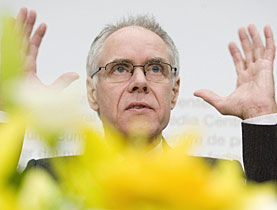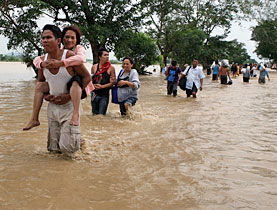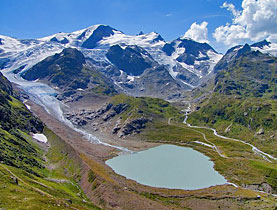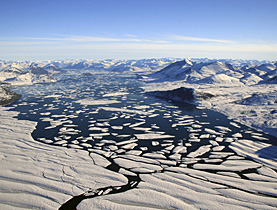Swiss expect progress at UN climate talks

Switzerland will seek a legally binding and comprehensive accord on greenhouse gas emissions at a United Nations climate conference in Copenhagen next month.
However, Environment Minister Moritz Leuenberger is wary of overambitious pledges and has dismissed squabbles over percentage figures for the follow-up to the Kyoto protocol.
The government confirmed that Switzerland wants to reduce carbon dioxide emissions 20 to 30 per cent by 2020 compared with 1990 levels, targets which are in line with the European Union.
Leuenberger, who will take part in the conference, will promote the introduction of a global greenhouse tax to support developing countries adversely affected by climate change.
At a news conference on Friday, he pointed out that Switzerland has pledged to cut CO2 emissions even if there is no agreement in Copenhagen.
“We are prepared to make a first step regardless of whether other countries decide to do the same,” Leuenberger said.
He added that the Swiss cabinet had made important progress over the past two years and approved a draft for a greenhouse tax which is now to be discussed by parliament.
Leuenberger does not see the point in squabbling over percentages targets for proposed cuts.
“What counts are concrete measures,” he said.
No miracles
He warned of setting the bar for the climate conference too high following the latest preparatory meetings.
“There won’t be any miracles in Copenhagen,” he said. He does not believe that a comprehensive and legally binding accord is realistic.
However, the minister is confident that a number of different targets will be set by the countries at the Copenhagen summit and that agreements will be struck between groups of countries.
He said only the sum of all these pledges will show whether the meeting is a success or a failure.
He quoted the former British prime minister Tony Blair, who highlighted the enormous complexity of climate negotiations. For his part Leuenberger considers Copenhagen a stage in a process that will continue beyond the summit, which is due to start on December 7.
“The Swiss cabinet certainly hopes that first concrete steps will be made in Copenhagen,” he said.
Disillusioned
The non-governmental environmental group, WWF Switzerland, has attacked the cabinet over its mandate for Copenhagen.
The organisation criticised the government for failing to set the 40-per-cent reduction target, needed for a substantial cuts in greenhouse gas emissions, and for an annual SFr1.7 billion ($1.7 billion) financial commitment to a global climate fund.
“The Swiss delegation might just as well stay at home,” said the group’s head of climate policy, Patrick Hofstetter, in a statement.
He recommended the government follow the example of Germany, Britain, Norway and Sweden to present “serious contributions to help solve the problems of climate change.”
Urs Geiser, swissinfo.ch
Intergovernmental Panel on Climate Change (IPCC) figures suggest that to have a reasonable chance of avoiding 2°C of warming, global emissions would need to peak and start to decline within about 15-20 years.
The IPCC says industrialised countries should reduce their emissions by 25%-40% by 2020 compared with 1990 levels. It urges rich nations to reduce greenhouse gases by 85% by 2050 and developing countries to reduce their emissions by 50%.
The Swiss government proposes a 20% reduction by 2020 compared with 1990 levels. It says it is ready to raise the objective to 30%, depending on the outcome of the Copenhagen talks.
The first UN climate conference, popularly known as the Earth Summit, was held in Rio de Janeiro in 1992. It produced an international environmental treaty, the Framework Convention on Climate Change.
A follow-up conference in Kyoto, Japan, in 1997 produced the Kyoto Protocol, with binding commitments to reduce greenhouse gases. The 178-nation accord is a 1997 annexe to the 1992 treaty that requires 37 industrial nations to reduce greenhouse gas emissions by an average of 5% below 1990 levels by 2010.
The UN Climate Change Conference in Copenhagen from December 7-18, 2009 is expected to lead to a post-Kyoto climate agreement. Negotiations will focus on reducing human causes of climate change (mitigation) and adaptation as well as the needs of developing countries (financial, technological, institutional).
The Kyoto Protocol’s targets for reducing emissions apply only to a small set of countries and expire in 2012. Governments want a new treaty that is bigger, bolder, wider-ranging and more sophisticated than the Kyoto agreement.
In June, the G8 group of industrialised nations and a number of large developing countries agreed that the rise in global average temperature should be limited to 2°C in comparison with pre-industrial levels.

In compliance with the JTI standards
More: SWI swissinfo.ch certified by the Journalism Trust Initiative






You can find an overview of ongoing debates with our journalists here . Please join us!
If you want to start a conversation about a topic raised in this article or want to report factual errors, email us at english@swissinfo.ch.